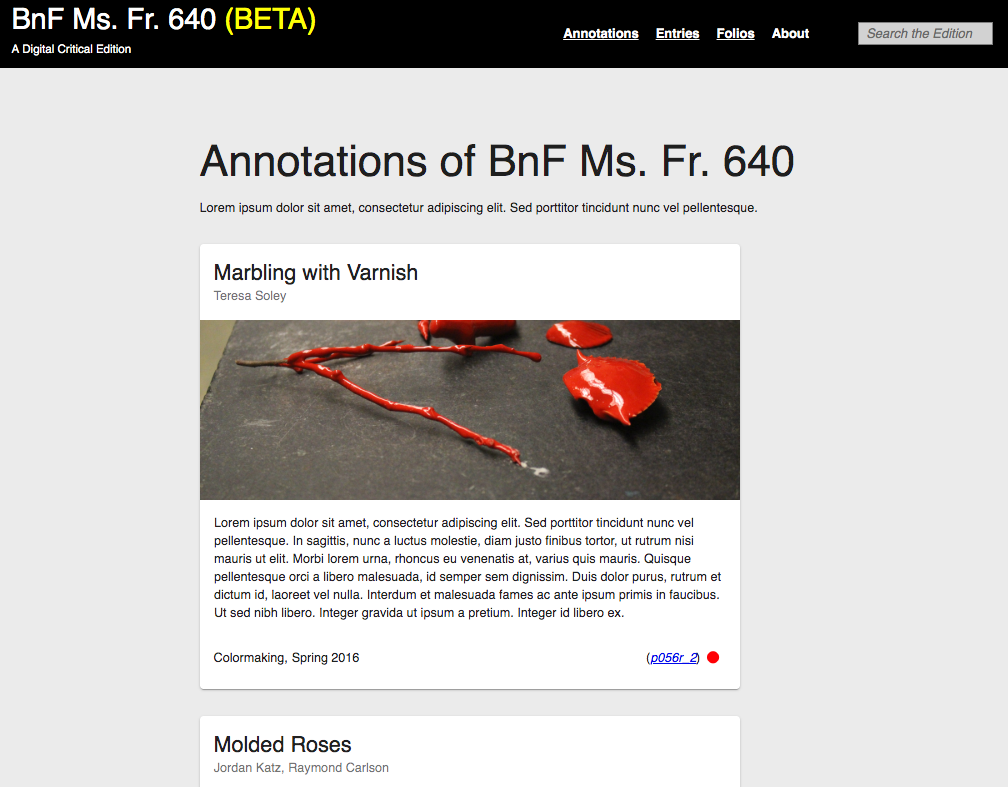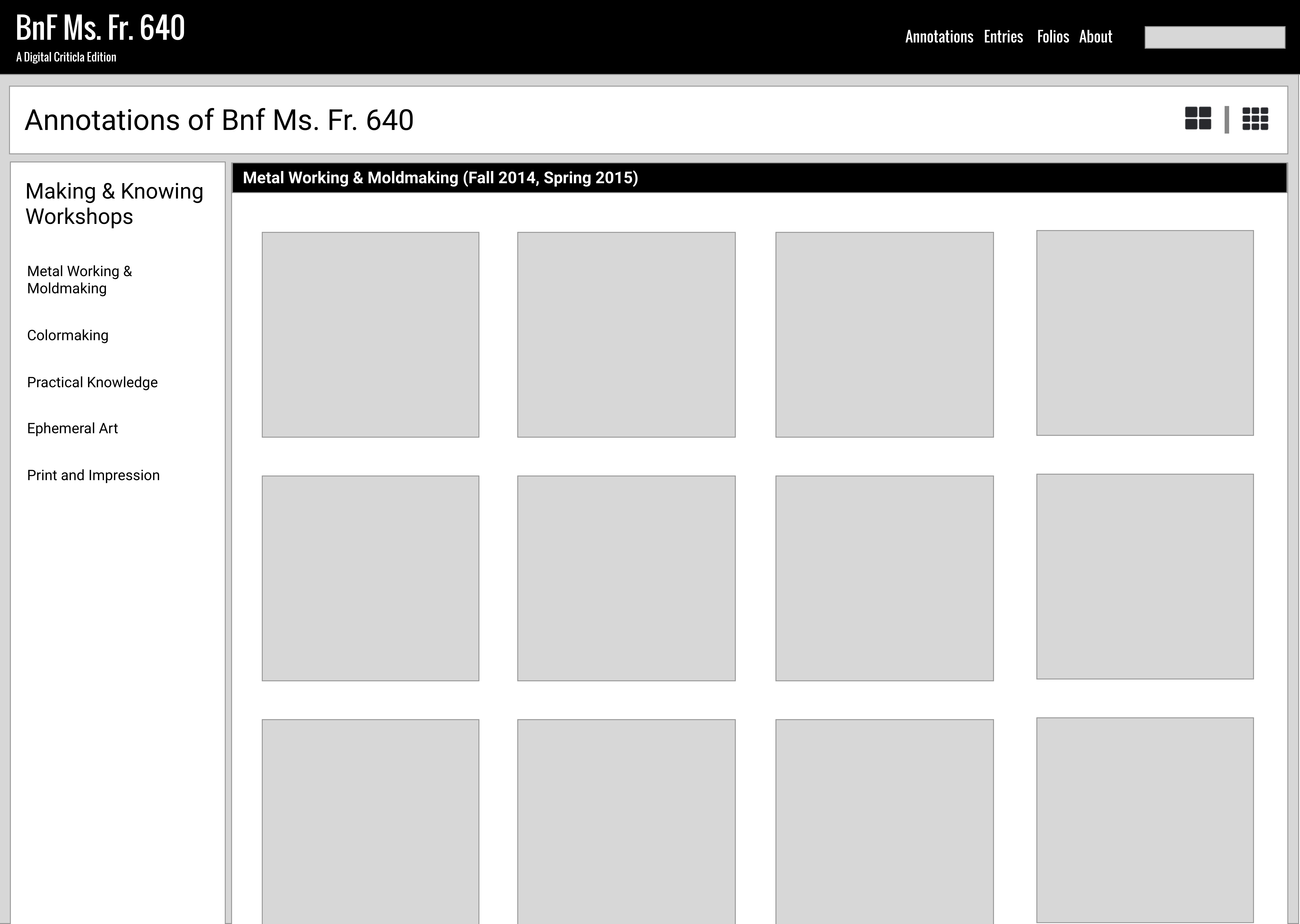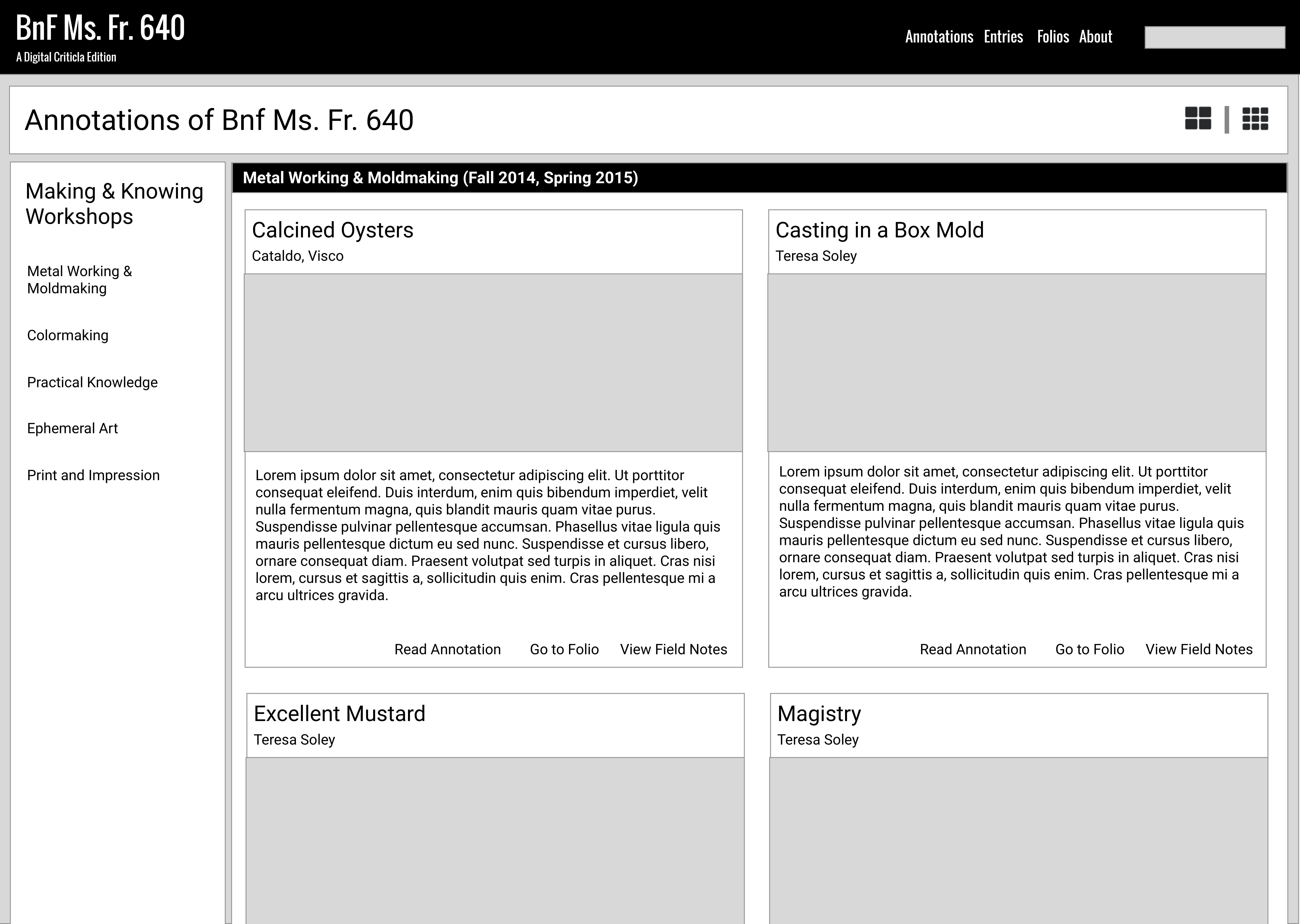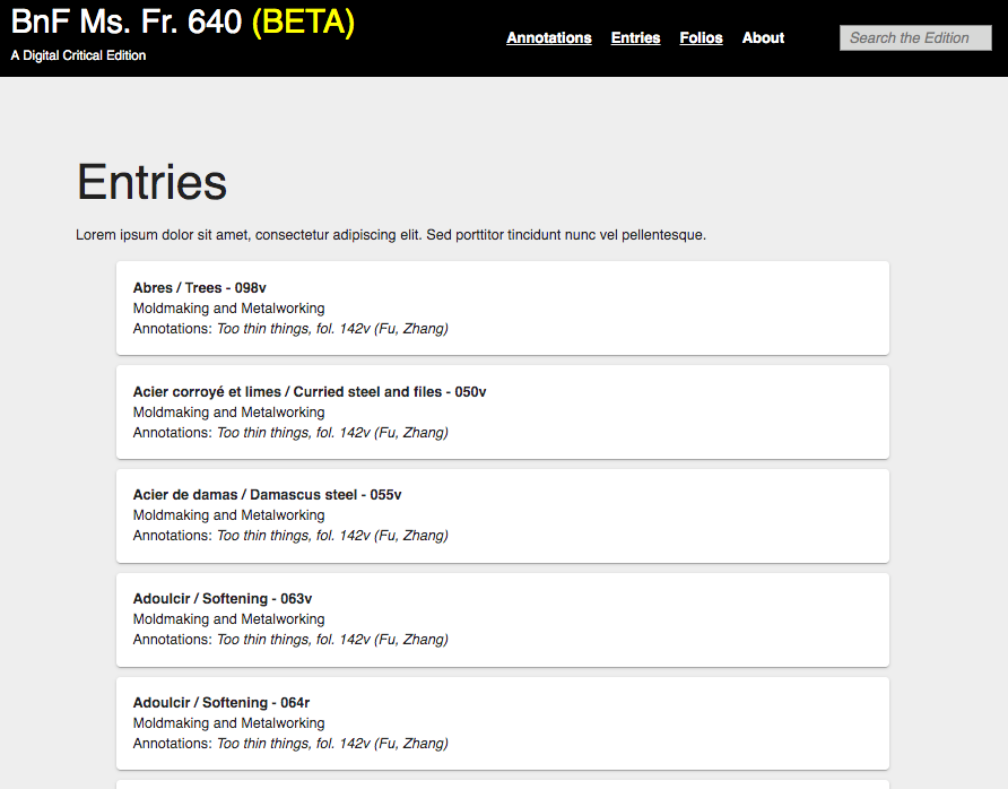Digital Critical Edition
The Making and Knowing Project’s digital critical edition of Ms. Fr. 640 is openly accessible at https://edition640.makingandknowing.org.
The digital critical edition comprises an open access, electronically searchable, and intuitive user-directed online format of the four versions of the manuscript:
- high-definition facsimile images
- diplomatic French transcription
- normalized French transcription
- English translation
The critical apparatus includes multimedia annotations, essay-length analyses of techniques and materials, a glossary of technical terms, and a list of resources for further exploration, such as researcher field notes, paleography tools, the Research and Teaching Companion, and the principles guiding the Project’s translation and reconstruction decisions.
Completed Annotations
| Moldmaking and Metalworking | Colormaking | Practical Knowledge | Ephemeral Art | Impression |
| Wax Tallow | Oil Painting on Taffeta | Imitating Raw Nature | Azur D’esmail | Corrode and Dissolve |
| One-Sided Cast Iron Medals | Jasper Imitation on Horn | Bread in Early Modern Europe | Carton or Paper | La Maison Rustique |
| Molded Roses | Brushes | Smoke as Medicine | Stucco | Tablets |
| Original Patterns | Reverse Painting on Glass | Spinet Playing by Itself | Artifical Grottos for Festivals | Transferring Images |
| Molder Letter Paper | Oil on Taffeta | Black Sulfered Wax | Oil Paintings on Taffeta | Black Varnish for Armor |
| Calcined Oysters | Pierrerie | For Cages and Glass | Tin and its Uses | |
| Sulfer and Additives | Emerald | Buckram Sausage | What is Stone? | |
| Excellent Mustard | Color for Green | To Relieve the Pain of G[out] | Polishing and Engraving Stones | |
| Magistry |
Ruby |
Distillation | Wax for Seals | |
| Casting in a Box Mold | Damasked Cloth | Fish Glue | Pinking Satan | |
| Sands and Binders | Gold Without Gold | Collecting Cures | To Shrink an Object | |
| Ox Bone and Rock Salt | Azure Enamels |
Keeping Dried Flowers in the Same Condition All Year |
BnF Ms. Fr. 640 and The Jewell House of Art and Nature | |
| Too Thin Things | Rouge Clair | Medicinal Plasters | Letters and Molded Paper | |
| Foundations of Small Tin Work | Apprenticeship of the Painter | Salve for Burns | ||
| Imitation Coral | Black Color for Dyeing | Bread as Mediating Material | ||
| Alabaster Sand | Dragon’s Blood | Silkworms in Algiers | ||
| Sugar Casting | Esmail | Acid as Dental Cleanser | ||
| Knowledge Exchange | Gilding on Paper and Parchment | Keeping Dried Flowers in the Same Condition All Year | ||
| Varnish for Lutes | Marbling with Varnish | |||
| Ox Bone, Wine, and Elm Root Sandcasting | Painting Skin and Shadows a destrempe | |||
| Powder for Hourglasses | Or Mat | |||
| Molding a Rose | Sleight of Hand Tricks | |||
| Making Millas | Sulfuric Acid as a Writer’s Material |
University of Amsterdam Completed Annotations
In 2014-15, M&K joined with the University of Amsterdam to complete annotations. Please visit our collaborations page to learn more about this partnership.
| Gilding On Glass | What is “Spat”? | Spike Lavender |
| Lessive | Sieves (I) | Varnish for Oil |
| Trees and Turpentines | Sieves (II) | Imitation Marble (I) |
| Incuse Reverse Cast Experiment | Sieves (III) | Imitation Marble (II) |
| Use of Gold | Topaz Leaf | Scudegrun |
| Gold without Gold | Silk Cultivation | Alun |
| Dragon’s Blood (I) | Essential Oils | Resin Varnishes |
| Dragon’s Blood (II) | Chalk in Lakes | Reverse Glass Painting |
| The Application of Dragon’s Blood on Metal | Yellow Lakes | All That Glitters is Not Gold |
| Eau de Vie | Scales Black | Colors on Glass |
Prototypes
Explore the Project’s prototypes of the digital critical edition:
- Minimal Edition of the Transcriptions and Translations of Ms. Fr. 640 (Last released July 2018)
- Prototype Reading Display
- Prototype Manuscript (produced by xpMethod)
- Prototype Annotation: One-Sided Hollow Cast Medals
Sandbox
The Secrets of Craft and Nature Sandbox presents experimental, provisional, and in-progress work that expands upon the engagement and analyses with the data, topics, and content of Secrets of Craft and Nature and with the manuscript, BnF Ms. Fr. 640.
Sustainability and Open Access
Columbia University Libraries has committed to hosting and sustaining the digital critical edition and the Project’s data. This required that the critical edition was built on a limited technology stack using the most durable formats that allow migration and conversion of all digital assets in response to changing technologies. The Project’s data is open access, thus available to be reconfigured and repurposed for new and experimental applications beyond the scope of the Project itself, including advanced data visualization, textual analysis, and further historical, technical, and material research.
Digital Humanities and Pedagogy
The Making and Knowing Project has offered three courses in the digital humanities.
GR8975: What is a Book in the 21st Century?
In Spring 2017, the Making and Knowing Project offered a new graduate-level digital humanities seminar through the Department of History, “HIST GR8975: What is a Book in the 21st Century?” Using the English translation of Ms. Fr. 640 as the basic data set, students collaboratively created a minimal (i.e., limited, basic feature) digital edition by the end of the semester, effectively prototyping a design for the Project’s final digital critical edition. Additionally, the course introduced students both theoretically and practically to the concepts and tools relevant to the creation of a digital edition, such as image and text capture; metadata, tracking, and data management; data curation; transformations to, representations of, and interfaces of digital resources; and archiving, licensing, persistence, and re-usability. The seminar thus equipped participating students with identifiable, measurable, and repurposable digital skills while furthering the Project goals.
Explore our minimal edition:
Read the Spring 2017 “What is a Book in the 21st Century?” syllabus
W4172: 3D User Interfaces and Augmented Reality
In Spring 2018 and 2019, Professor Steven Feiner taught a reorientation of this computer science course for advanced undergraduate students. Throughout the semester, students learned methods for designing and developing effective 3D user interfaces, from desktop to immersive, including augmented reality, mixed reality, and virtual reality. In lieu of a final exam, students worked in groups to create a mobile augmented reality (AR) application. In 2018, all projects focused on aspects of the Making and Knowing Project. In 2019, students were given the option, but not required to use Making and Knowing data. Student groups were given full access to Making and Knowing Project data and were assisted by members of the Project staff, who also attended the final presentations. Select applications were selected for further development.
Read the Spring 2019 “User Interfaces and Augmented Reality” syllabus
GU4031: Transforming Texts: Textual Analysis, Literary Modeling, and Visualization
Designed for graduate and advanced undergraduate students in the social sciences, humanities, and computer science, this Spring 2019 hybrid course was situated at the crossroads of historical exploration and computer sciences. Students were exposed to digital literacy tools and computational skills through the lens of the Making and Knowing Project. This course built off the encoded English translation of the manuscript, prepared by the Spring 2017 course “What is a Book in the 21st Century?” The skills students learned over the course of the semester were widely applicable to other types of Digital Humanities projects, and indeed, in many fields outside of traditional academic study. For the final project, students collaborated to investigate linguistic features of Ms. Fr. 640 using natural language processing and text mining techniques. These projects shed light on topics of interest within the manuscript and uncover connections within the textual data. By working alongside computer science students, the groups learned to adapt and recode data sets, and to view them into a variety of visualizations.
Read the Spring 2019 “Transforming Texts” syllabus
Ms. Fr. 640 in Virtual and Augmented Reality
The Columbia University Computer Graphics and User Interfaces Lab (CGUI), led by Professor Steven Feiner, has developed an augmented reality (AR) toolset to complement the digital critical edition. These interactive tools help communicate the practice-based experiential knowledge generated in the Making and Knowing lab, allowing readers to experience the process of historical techniques through cutting-edge visualization technologies, including Microsoft HoloLens and Google Tango devices.
CGUI Research Assistant Samantha Siu developed a mobile app that allows users to add impromptu notes, take video, and capture photos while viewing items or undertaking an experiment in the Project laboratory. For their final project in GU4031: Transforming Texts, a student group collaborated with Samantha to test her application and develop a test database in which the entire process of following a recipe and the corresponding user’s annotation at each step is readily available.
Explore the AR tools as they develop:









